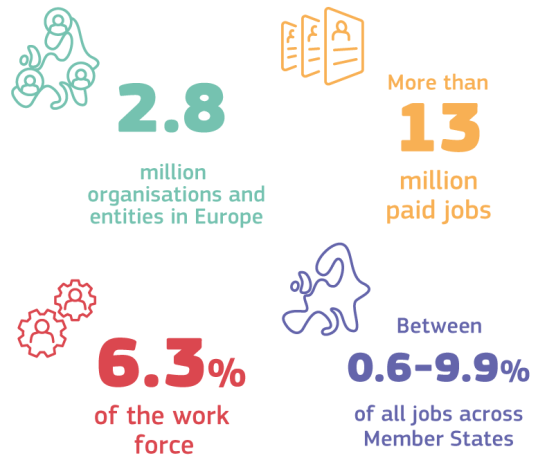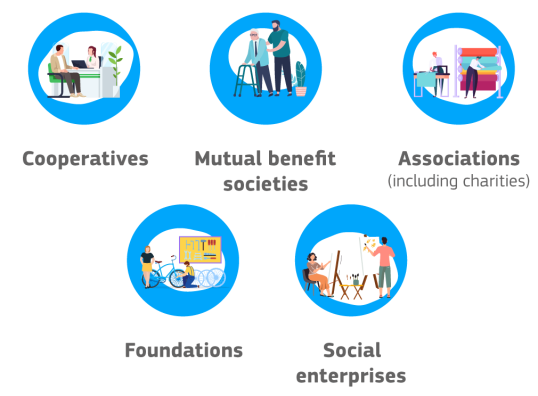What is the social economy?
The social economy encompasses a wide range of entities with different business and organisational models that share the objective of systematically putting people first, producing a positive impact on local communities and pursuing a social and/or environmental cause.
Social economy entities are private entities, independent of public authorities, and may assume various legal forms: cooperatives, mutual benefit societies, associations (including charities), foundations, and social enterprises. They share the following key principles and features:
- the primacy of people as well as social and/or environmental purpose over profit;
- the reinvestment of most of the profits and surpluses to further pursue their social and/or environmental purposes and carry out activities in the interest of members/users (‘collective interest’) and/or society at large (‘general interest’); and
- democratic and/or participatory governance (openness of management to stakeholders, democratic decision-making process, participation of members and/or employees in decision-making).
The social economy operates in a large variety of economic sectors: agriculture, forestry and fishing, construction, reuse and repair, waste management, wholesale and retail trade, energy and climate, information and communication, financial and insurance activities, real estate activities, professional, scientific and technical activities, education, human health and social work activities, arts, culture and media… just to name a few! (Source: This EU definition of social economy is paraphrased from the Social economy action plan 2021, page 5)
Key figures about social economy

A note on the social economy data used: The best currently available data on the social economy has some limitations and dates back a few years. For more details, see our note on social economy data.
Definitions and glossary
Defining the social economy is a challenging task because of its diversity and the various traditions in different countries around the globe. The EU definition paraphrased above is therefore not the only attempt of defining what the social economy is.
Expressions other than "social economy" are used as well: for example "Social and Solidarity Economy" and "Third sector".
Find out more about definitions and consult our social economy glossary

Mapping of stakeholders and networks
Social economy organisations play a key role in driving the social economy in Europe. For the Social Economy Gateway, we have compiled a list with some of the most relevant organisations at EU-level:
Social economy worldwide
Social economy entities exist globally, and the traditions and structures of social economy ecosystems vary across different regions and countries.
International organisations such as the Organisation for Economic Co-operation and Development, the International Labour Organisation and the United Nations are working on the topic of social economy worldwide.
Social economy declarations
In the past ten years, there have been a number of political declarations on (or related to) the social economy. Please see below a list of these declarations and the links to their full texts.

